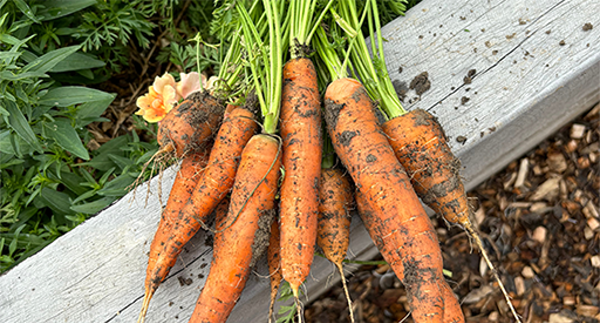
CARROT QUICK START CHECKLIST
- Pick your variety from favourites like All Seasons or Manchester Table.
- Choose the right spot: Carrots thrive in full sun and loose, free-draining soil.
- Sow directly: Always sow seeds directly into the garden using Tui Seed Raising Mix - carrots don’t transplant well.
- Feed and water: Use a phosphorus-rich fertiliser like Tui Potato Food and water deeply, especially in dry spells.
- Thin and harvest: Thin seedlings for straight roots and harvest when tops emerge and roots reach desired size.
CHOOSE YOUR CARROTS
Carrots are a staple in Kiwi gardens - easy to grow and packed with nutrients like beta-carotene, fibre, and antioxidants. They come in a range of shapes and sizes and once you taste your own sweet homegrown carrots store-bought won’t compare!
Popular varieties include:
- All Seasons
- Manchester Table
- Roly Poly (can be transplanted – a rare exception!)
Sow seeds in spring, summer, and early autumn. Always use fresh seed for best germination.
PREPARE THE SOIL
- Carrots need loose, well-dug, free-draining soil to grow straight and strong. Avoid hard materials such as stones and chunks of bark and wood that can obstruct root growth.
- Prepare your garden bed by mixing Tui Sheep Pellets and Tui Compost into your existing soil.
GET PLANTING
- Carrots must be sown directly into the ground or containers - transplanting damages their delicate roots.
- Add a layer of Tui Seed Raising Mix to create the perfect sowing bed. If growing in containers make sure they are at least 30cm deep and fill with Tui Vegetable Mix, before adding a layer of Tui Seed Raising Mix.
- Make shallow furrows and water well.
- Sow seeds as directed on the packet.
- Lightly cover with mix and press gently.
- Water lightly and regularly. It’s very important that carrot seeds don't dry out during germination, which can take up to 21 days.
FEED AND NOURISH
- Carrots use nutrients from the soil as they grow, so feeding is key to a healthy crop.
- Choose from a variety of different Tui fertiliser options, depending on what suits you and your garden:
- Tui Potato Food – rich in phosphorus for strong root development. It can be applied every four weeks and is not recommended for pots and containers.
- Tui Vege & Herb Liquid Superfood – is perfect for quick results in pots as plants are able to absorb the nutrients immediately. Suitable for carrots growing in pots and containers or in the garden. For best results feed weekly.
- Tui Organic Seaweed Plant Tonic – is great for garden beds, pots and containers to boost growth and resilience.
- Water deeply and consistently.
- Thin seedlings according to the spacing recommended on the seed packet to avoid crowding and promote straight, evenly sized carrots.
FREQUENTLY ASKED QUESTIONS
When is the best time to plant carrot seeds in New Zealand?
- The ideal time to plant carrots in New Zealand is during spring, summer, and early autumn - typically between September and April.
- Carrots prefer cooler growing conditions, so avoid sowing during the peak of winter or extreme heat.
How long do carrots take to grow in New Zealand?
- Carrots usually take 12–16 weeks to mature.
- Early thinning and consistent watering help ensure straight, evenly sized roots.
- Carrots are ready to harvest when their tops peek through the soil and reach about 1cm in diameter. Colour and size vary by variety, so check regularly. Gently pull or lift from the soil to avoid breakage.
Can I grow carrots in containers or pots in NZ?
- Carrots grow well in containers as long as the pot is at least 30cm deep.
- Use a loose, free-draining mix like Tui Vegetable Mix and avoid overcrowding to allow roots to develop properly.
- Consistent watering throughout the growing season will prevent carrots from splitting and cracking.
Why are my homegrown carrots misshapen or forked?
- Misshapen carrots are often caused by compacted soil, transplanting, or overcrowding as well as rocks, chunks of wood and bark.
- To grow straight carrots, sow seeds directly into loose, well-prepared soil and thin seedlings early.
- Avoid fresh manure or overly rich fertilisers, which can distort root growth.
Discover more advice and inspiration for growing your own veges at the Vege Hub >